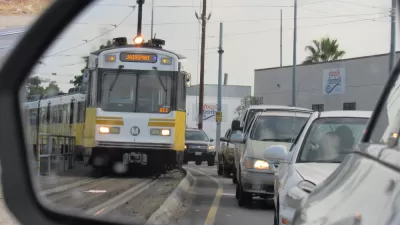One of the most heavily used rail lines in the country, the Metro Blue Line in Los Angeles County, will be closed for eight months in 2019.

"Metro is preparing to close the 22-mile Blue Line for a total of eight months next year to complete the modernization of the transit agency’s oldest train line," reports Steve Scauzillo. The closures will actually be broken into two, four-month segments. The southern half will be closed first, starting in January. The northern half will be closed after improvements on the first half of the project are complete.
The Los Angeles County Metropolitan Transportation Authority (Metro) will spend $300 million on improvements while the line is closed. "The agency plans to add four new switches that allow trains to move quicker, new signals, new tracks in downtown Long Beach and improvements at street level intersections, especially at the Washington Boulevard and Flower Street junction near downtown Los Angeles where cars have crashed into trains, causing significant delays," explains Scauzillo. "A major portion of the project will include tearing down and rebuilding the Willowbrook/Rosa Parks Station in Compton, the fourth busiest station in the Metro light-rail system and where Blue Line passengers transfer to the Green Line, an east-west line paralleling the 105 Freeway."
The changes will remove ten minutes from travel times between Los Angeles and Long Beach. The main talking point favored by Metro officials when justifying this project, however, is bringing the route into "good repair."
FULL STORY: Blue Line in Long Beach to close for a total of eight months next year to undergo $300 million renovation

Maui's Vacation Rental Debate Turns Ugly
Verbal attacks, misinformation campaigns and fistfights plague a high-stakes debate to convert thousands of vacation rentals into long-term housing.

Planetizen Federal Action Tracker
A weekly monitor of how Trump’s orders and actions are impacting planners and planning in America.

In Urban Planning, AI Prompting Could be the New Design Thinking
Creativity has long been key to great urban design. What if we see AI as our new creative partner?

Baker Creek Pavilion: Blending Nature and Architecture in Knoxville
Knoxville’s urban wilderness planning initiative unveils the "Baker Creek Pavilion" to increase the city's access to green spaces.

Pedestrian Deaths Drop, Remain Twice as High as in 2009
Fatalities declined by 4 percent in 2024, but the U.S. is still nowhere close to ‘Vision Zero.’

King County Supportive Housing Program Offers Hope for Unhoused Residents
The county is taking a ‘Housing First’ approach that prioritizes getting people into housing, then offering wraparound supportive services.
Urban Design for Planners 1: Software Tools
This six-course series explores essential urban design concepts using open source software and equips planners with the tools they need to participate fully in the urban design process.
Planning for Universal Design
Learn the tools for implementing Universal Design in planning regulations.
planning NEXT
Appalachian Highlands Housing Partners
Mpact (founded as Rail~Volution)
City of Camden Redevelopment Agency
City of Astoria
City of Portland
City of Laramie




























